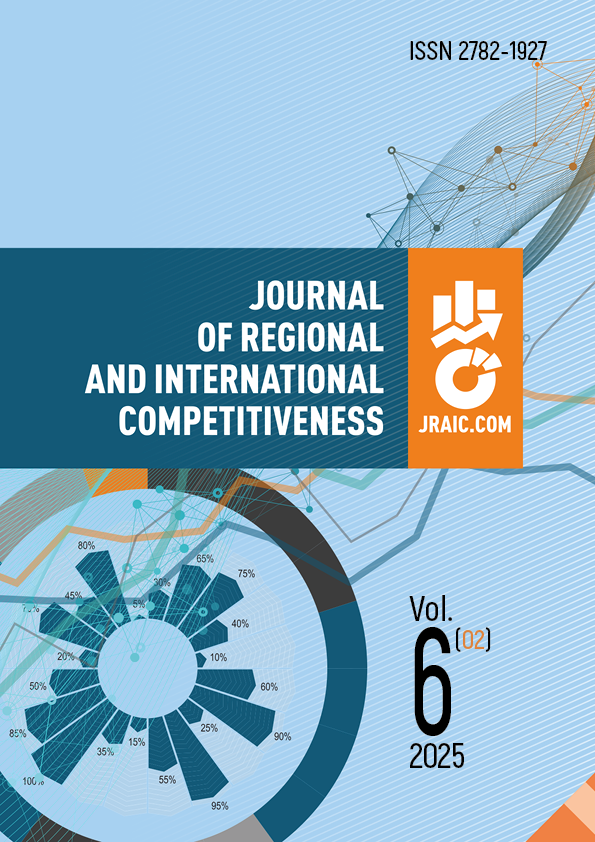Ivanovo, Ivanovo, Russian Federation
Ivanovo, Ivanovo, Russian Federation
With the rapid development of information technologies, digitalisation is becoming a key factor in socio-economic development. However, the process of digital transformation involves a number of challenges, including changes in the nature of interaction between economic actors, transformation of reproduction chains, and redistribution of economic interests. At the same time, the issue of a comprehensive analysis of digitalisation in terms of a political economy approach remains insufficiently studied in the scientific literature. This research concerns with the digital transformation of the economy through the prism of political economy analysis. It allows us to identify the mechanisms of changes in economic interests, transformation of social reproduction structure and changes in the system of distributive relations. The political economy approach provides an opportunity to analyse the role of the state, corporations, and society in the process of digital transformation, examine the emerging economic imbalances associated with digital inequality, capital concentration and income redistribution in the digital economy. The purpose of the study is to comprehensively examine the processes of economy digitalisation in terms of the system-integrative analysis. The research considers the political economy approach in the context of digitalisation, the interests of key participants in the digital economy, transformation of reproduction chains, distribution relations, assessment of the impact of digital technologies on labour relations, and economic policy. The research methodology is based on the system-integrative approach, methods of logical, criterion, comparative, and structural-functional analysis. The main results of the study indicate the redistribution of economic interests, changes in the structure of social reproduction and the mechanisms of state regulation in terms of the digital economy. Indeed, digital transformation requires active state participation in the formation of digital institutions, regulation of new economic relations, and ensuring digital sovereignty. The practical application of the results obtained is possible in the development of digital transformation strategies.
digital economy; digital infrastructure; digital environment; digitalisation of the industry; political economic approach; transformation of reproductive chains
1. Abashkin, V. L., Abdrakhmanova, G. I., Vishnevsky, K. O., et al. (2024). Digital economy: A short statistical collection. National Research University Higher School of Economics, ISIEZ HSE. Retrieved December 10, 2024, from https://www.hse.ru/mirror/pubs/share/892396113.pdf
2. Abashkin, V. L., Abdrakhmanova, G. I., Vishnevsky, K. O., et al. (2024). Indicators of the digital economy 2024: A statistical collection. National Research University Higher School of Economics, ISIEZ HSE. Retrieved December 23, 2024, from https://www.hse.ru/mirror/pubs/share/892396113.pdf
3. Dyachenko, O. V. (2019). Productional relations in the conditions of transition to the digital economy. Voprosy politicheskoj ekonomii [Issues of Political Economy], (2), 7–15.
4. Frieden, D. (2020). The political economy of economic policy. Finansy i razvitie [Finance and Development], 57(2), 4–7.
5. Irodova, E. E., & Sokolov, A. M. (2023). Digital transformation of the socio-economic environment: Improving the quality of the "consumer experience". Teoreticheskaya ekonomika [Theoretical Economics], (11), 84–95.
6. Kuznetsov, A. V., Prokhorova, M. P., Lebedeva, T. E., Tsapina, T. N., et al. (n.d.). Business ecosystems: Organizational and managerial aspects. Moskovskij ekonomicheskij zhurnal [Moscow Economic Journal], (10), 617–628.
7. Melmont, D. D. (2024). The impact of digitalization on the economic and social development of Russia's regions. Voprosy innovacionnoj ekonomiki [Russian Journal of Innovation Economics], 14(4), 1215–1228. DOI: https://doi.org/10.18334/vinec.14.4.122154; EDN: https://elibrary.ru/XTMUYS
8. Mellacher, P. (2021). Opinion dynamics with conflicting interests (Working Paper No. 28). University of Graz.
9. Pogosov, I. A., & Sokolovskaya, E. A. (2012). Distribution of GDP for consumption and accumulation and modernization in Russia. Federalism [Federalism], (3), 85–100. https://federalizm.rea.ru/jour/article/view/469?locale=ru_RU
10. Ricardo, D. (1955). Nachala politicheskoj ekonomii i nalogooblozheniya [The beginnings of political economy and taxation]. Progress.
11. Say, J. B. (1981). Traktat o politicheskoj ekonomii [A treatise on political economy]. Ekonomika.
12. Smith, A. (1962). Issledovanie o prirode i prichinah bogatstva narodov [An inquiry into the nature and causes of the wealth of nations]. Sotsekgiz.
13. Wurman, P. R., D’Andrea, R., & Mountz, M. (2008). Coordinating hundreds of cooperative, autonomous vehicles in warehouses. AI Magazine, 29(1), 9–20. https://ojs.aaai.org/aimagazine/index.php/aimagazine/article/view/2082
14. Zaitsev, S. Yu. (2022). Areas of interaction between digital corporations and the government in the political sphere of Russia. Politicheskaya ekspertiza: POLITEKS [Political Expertise: POLITEX], 18(1), 56–71. DOI: https://doi.org/10.21638/spbu23.2022.104; EDN: https://elibrary.ru/FPRJOE
15. Zakharov, A., Chekhranova, T. (2019). Trends in the Development of Electronic Commerce in International Practice. Russian Foreign Economic Journal, 6. https://ssrn.com/abstract=3984348




















